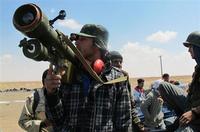-
Webcast of Forensic Handwriting Analysis Conference available online
On 4-5 June 2013 NIST and partnering organizations hosted the Measurement Science and Standards in Forensic Handwriting Analysis Conference. In case you missed this event or would like to view/listen again to the presentations, the archived video of the Webcast is now available online.
-
-
U.S. confirms: Assad used chemical weapons against Syrian rebels, civilians (updated)

The Obama administration has informed Congress a few minutes ago that the U.S. intelligence community has determined that the Assad regime has used chemical weapons on several occasions against both rebel forces and Syrian civilians. The U.S. intelligence community says these attacks, each using small quantities of sarin gas, have killed about 150 Syrians. The president’s deputy national security adviser, Ben Rhodes, told reporters that the president had decided to provide “direct military support” to the opposition. Rhodes said the U.S. military assistance to the rebels would be different in “both scope and scale” from what had been authorized before, which included non-lethal equipment such as night-vision goggles and body armor.
-
-
Detecting explosives, not toothpaste
Researchers want airports, border checkpoints, and others to detect homemade explosives made with hydrogen peroxide without nabbing people whose toothpaste happens to contain peroxide. This is part of the challenge faced in developing a portable sensor to detect a common homemade explosive called a FOx (fuel/oxidizer) mixture, made by mixing hydrogen peroxide with fuels.
-
-
Justice Department endorses NYPD’s stop-and-frisk

The Justice Department (DOJ) has entered the debate on the New York Police Department’s stop-and-frisk policy, telling a federal judge that DOJ endorses the program as long as there is independent oversight to monitor changes in the policy if civil rights violations occur.
-
-
U.S. confirms: Assad used chemical weapons against Syrian rebels, civilians
The Obama administration has informed Congress a few minutes ago that the U.S. intelligence community has determined that the Assad regime has used chemical weapons on several occasions against both rebel forces and Syrian civilians. The U.S. intelligence community says these attacks, each using small quantities of sarin gas, have killed about 150 Syrians.
-
-
NSA director: surveillance programs prevented “dozens” of terror attacks
Gen. Keith Alexander, the director of the National Security Agency (NSA) and commander of the U.S. Cyber Command, told lawmakers yesterday (Wednesday) that the NSA’s electronic surveillance programs have been indispensable in thwarting “dozens” of terrorist attacks on targets in the United States and abroad. He told the senators that securing a “cyber arena” could be done without infringing upon the privacy rights of Americans. “We do not see a tradeoff between security and liberty,” Alexander said, later adding, “We are trying to protect Americans.”
-
-
Al Qaeda-affiliated militants training in using shoulder-fired anti-aircraft missile

A Xerox copy of a 26-page manual with instructions on how to use man-portable air-defense systems, or MANPADS – also called SA-7 — was found in a building in Timbuktu in North Mali which was used by Al Qaeda in the Islamic Maghreb operatives during the 8-month control – April 2012 to February 2013 — of the area by Islamist militants. The Libyan military under Col. Qaddafi had about 15,000 SA-7s, but after the Qaddafi regime fell in November 2011, NATO forces and Libyan militias loyal to the government gained possession of only 5,000 of them. The rest have disappeared into the arsenals of different militias, and have probably found their way to different terrorist organizations in North Africa and the Middle East.
-
-
ACLU files lawsuit challenging NSA's phone surveillance
In the wake of the past week’s revelations about the NSA’s surveillance of phone calls, the yesterday American Civil Liberties Union (ACLU) filed a lawsuit charging that the program violates Americans’ constitutional rights of free speech, association, and privacy.
-
-
Responding to public health emergencies

Over the past decade, community engagement has become a central tenet of U.S. federal approach to public health emergency preparedness. Little is known, however, about how the vision of a ready, aware, and involved populace has translated into local practice.
-
-
Making jet fuel from switchgrass

The Energy Department’s National Renewable Energy Laboratory (NREL) is partnering with Cobalt Technologies, U.S. Navy, and Show Me Energy Cooperative to demonstrate that jet fuel can be made economically and in large quantities from a renewable biomass feedstock such as switch grass. The project could spur jobs in rural America, lead to less reliance of foreign oil.
-
-
White House to conduct urgent, comprehensive review of U.S. Syria policy
The White House today and tomorrow is conducting an urgent, and comprehensive, review of U.S. Syria policy, with a major policy announcement expected Wednesday or Thursday. The urgency is the result of changes on the battlefield. Bolstered with thousands of Hezbollah fighters, growing financial support from Iran and Iraq, around-the-clock arms shipments from Iran and Syria, and more direct Iranian involvement in overseeing the regime’s military operations, the Assad government has been able to turn the tide of war in its favor. Senior administration officials believe that arming the rebels may no longer be sufficient to reverse the Assad government’s gains unless the United States takes additional, and more direct, steps like carrying out airstrikes against Syrian forces.
-
-
Social media analytics help emergency responders
If you think keeping up with what is happening via Twitter, Facebook, and other social media is like drinking from a fire hose, multiply that by seven billion — and you will have a sense of what researchers who are working on SALSA (SociAL Sensor Analytics) are facing. Efforts of emergency responders and public health advocates could be boosted by SALSA.
-
-
Edward Snowden, an NSA contractor employee, says he is the source of NSA leaks
Edward Snowden, a 29-year-old former technical assistant in the CIA and more recently an employee of the defense contractor Booz Allen Hamilton, has identified himself as the source of the leaks about three massive NSA surveillance schemes. Snowden says the NSA’s surveillance activities are all-consuming; these activities “are intent on making every conversation and every form of behavior in the world known to [the NSA].” He said that once he concluded that the NSA’s surveillance scheme would soon be irrevocable, it was just a matter of time before he chose to act. “What they’re doing” poses “an existential threat to democracy,” he said.
-
-
Second NSA domestic surveillance scheme revealed: data mining from nine U.S. ISPs

A day after it was revealed that the NSA was collecting communication information on millions of Verizon’s U.S. customers, another NSA domestic surveillance scheme was exposed: the NSA and the FBI have been tapping directly into the central servers of nine leading U.S. Internet service providers for the purpose of harvesting audio, video, photographs, e-mails, documents, and connection logs. The information collected allowed intelligence analysts to track an individual’s movements and contacts over time.
-
-
Nevada lawmakers fail to restore DHS funds to Las Vegas
Members of the Nevada congressional delegation were taken aback when they found that Las Vegas would lose DHS funding for anti-terror programs, and immediately began to work their fellow lawmakers on the Hill to add money to DHS security grants to cities. The effort failed, and Las Vegas will have to find other sources of funding for some of the city’s security programs.
-
More headlines
The long view
AI-Controlled Fighter Jets May Be Closer Than We Think — and Would Change the Face of Warfare
Could we be on the verge of an era where fighter jets take flight without pilots – and are controlled by artificial intelligence (AI)? US R Adm Michael Donnelly recently said that an upcoming combat jet could be the navy’s last one with a pilot in the cockpit.
What We’ve Learned from Survivors of the Atomic Bombs
Q&A with Dr. Preetha Rajaraman, New Vice Chair for the Radiation Effects Research Foundation in Hiroshima and Nagasaki, Japan.
Need for National Information Clearinghouse for Cybercrime Data, Categorization of Cybercrimes: Report
There is an acute need for the U.S. to address its lack of overall governance and coordination of cybercrime statistics. A new report recommends that relevant federal agencies create or designate a national information clearinghouse to draw information from multiple sources of cybercrime data and establish connections to assist in criminal investigations.
Autonomous Weapon Systems: No Human-in-the-Loop Required, and Other Myths Dispelled
“The United States has a strong policy on autonomy in weapon systems that simultaneously enables their development and deployment and ensures they could be used in an effective manner, meaning the systems work as intended, with the same minimal risk of accidents or errors that all weapon systems have,” Michael Horowitz writes.
Twenty-One Things That Are True in Los Angeles
To understand the dangers inherent in deploying the California National Guard – over the strenuous objections of the California governor – and active-duty Marines to deal with anti-ICE protesters, we should remind ourselves of a few elementary truths, writes Benjamin Wittes. Among these truths: “Not all lawful exercises of authority are wise, prudent, or smart”; “Not all crimes require a federal response”; “Avoiding tragic and unnecessary confrontations is generally desirable”; and “It is thus unwise, imprudent, and stupid to take actions for performative reasons that one might reasonably anticipate would increase the risks of such confrontations.”
Luigi Mangione and the Making of a ‘Terrorist’
Discretion is crucial to the American tradition of criminal law, Jacob Ware and Ania Zolyniak write, noting that “lawmakers enact broader statutes to empower prosecutors to pursue justice while entrusting that they will stay within the confines of their authority and screen out the inevitable “absurd” cases that may arise.” Discretion is also vital to maintaining the legitimacy of the legal system. In the prosecution’s case against Luigi Mangione, they charge, “That discretion was abused.”
